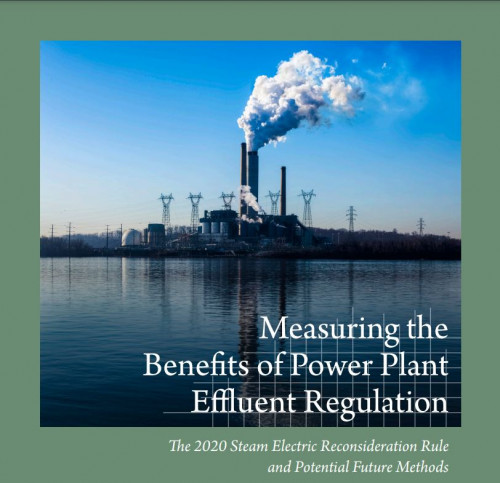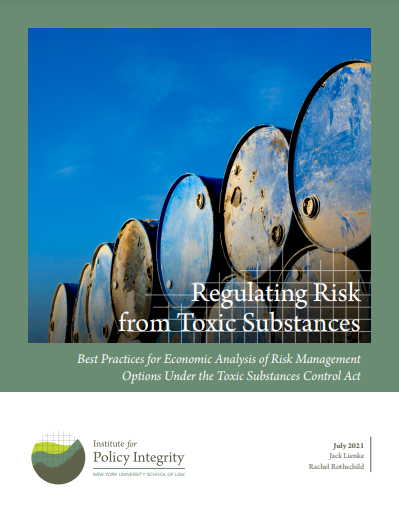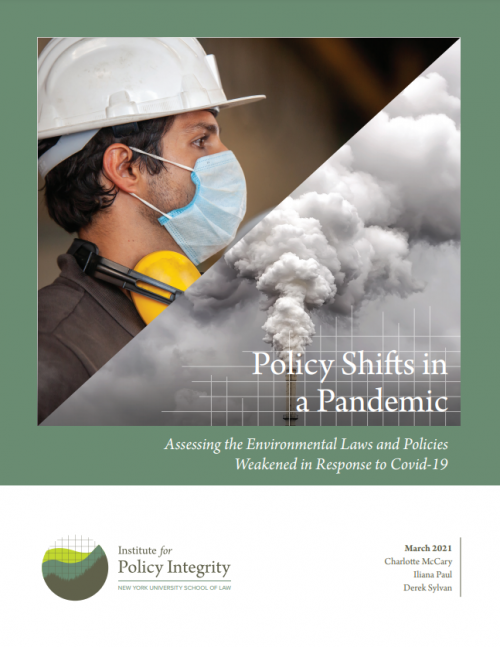-
EPA Restores Legal Foundation to Limit Mercury & Air Toxics from the Power Sector
This month, EPA restored the legal foundation for regulating emissions of mercury and other hazardous air pollutants (HAPs) from coal- and oil-fired power plants under section 112 of the Clean Air Act. Policy Integrity has long recommended that EPA adopt such an approach that considers unquantified and ancillary effects, as is consistent with the best economic practices and the law, including through our comments on the 2022 proposed rule and an amicus brief opposing the 2020 finding.
-
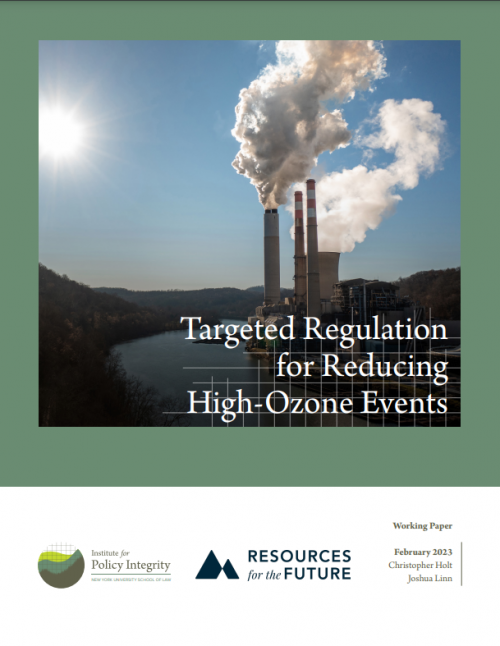
Targeted Regulation for Reducing High-Ozone Events
Working paper
Nitrogen oxides (NOx) are a precursor to ground-level ozone, a pernicious pollutant that is harmful to human health and ecosystems. Despite decades of regulations and a sharp decline in NOx emissions, episodic high-ozone events prevent many areas from attaining air quality standards. Theoretically, spatially or temporally differentiated emissions prices could be more cost effective at reducing such events than a uniform price. To test this prediction, with data from EPA and NOAA spanning 2001–2019, this working paper uses novel empirical strategies to estimate (1) the link between hourly emissions and high-ozone events and (2) hourly marginal abatement costs. These estimates form the basis for simulations that compare uniform and differentiated emissions pricing. Consistent with economic theory, differentiated pricing is substantially more cost effective at reducing high-ozone events, but this advantage depends on the accuracy of the estimated NOx–ozone relationship.
-
Still Your Grandfather‘s Boiler: Estimating the Effects of the Clean Air Act‘s Grandfathering Provisions
Working paper
While vintage differentiation is a highly prominent feature of various regulations, it can induce significant biases. We study these biases in the context of New Source Review—a program within the US Clean Air Act imposing costly sulfur dioxide (SO2) abatement requirements on new boilers but not existing ones. In particular, we empirically investigate how the differential treatment of coal boilers shaped the generation landscape by affecting unit utilization, retirement, and emissions. Focusing solely on the additional SO2 emissions, we estimate annual costs of up to $65 billion associated with the vintage differentiation in New Source Review.
-
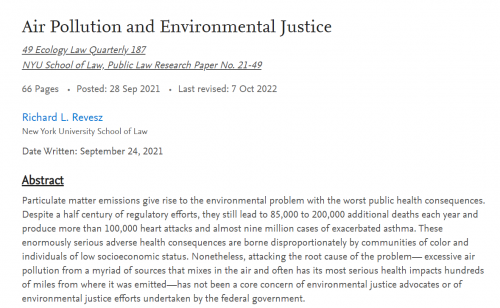
Air Pollution and Environmental Justice
Published in Ecology Law Quarterly
The article examines the failures of the U.S. Environmental Protection Agency to address the environmental justice harms from air pollution and identifies three recent development that could augur beneficial change.
-
Comments to EPA on its Proposed Asbestos Risk Management Rule
The Environmental Protection Agency (EPA) has proposed a ban on multiple conditions of use of chrysotile asbestos. The Institute for Policy Integrity and Professor Rachel Rothschild at the University of Michigan Law School submitted comments on the agency’s economic analysis of the proposed rule, identifying numerous ways EPA underestimated the health benefits from reduced cancer cases and lung illnesses and could strengthen the robust scientific, economic and legal basis for EPA’s proposed rule.
-
Measuring the Benefits of Power Plant Effluent Regulation
The 2020 Steam Electric Reconsideration Rule and Potential Future Methods
EPA is considering regulations that would clean up the wastewater discharges from power plants, after they were stalled and then rolled back under the Trump administration. As it conducts that analysis, this report urges EPA to provide a robust assessment of the benefits of the regulation, improving on analysis that was conducted in the Obama era. The report reviews the economic framework, literature, and analyses performed to support both the original Obama-era rule and Trump-era revisions, building on Davis Noll and Rothschild (2021), which detailed numerous impacts of the 2020 Rule that EPA neglected to examine. This review highlights key considerations that will strengthen future regulations.
-
Comments to EPA on Proposal to Reaffirm “Appropriate-and-Necessary” Finding for Regulating Hazardous Air Pollution from Power Plants
In February 2022, the Environmental Protection Agency (EPA) proposed: (1) to revoke its May 2020 finding that it is not appropriate and necessary to regulate coal- and oil-fired electric utility steam generating units (EGUs) under Clean Air Act (CAA) Section 112 (2020 Action), and (2) to reaffirm the Agency's April 2016 finding that it remains appropriate and necessary to regulate hazardous air pollutant (HAP) emissions from EGUs after considering cost (2016 Supplemental Finding). Our comments on the Proposal explain why EPA should finalize both these actions as consistent with the Clean Air Act, case law, executive directives, principles of sound economic analysis, and past agency practice.
-
Comments to OSHA on Heat Injury and Illness Prevention at Work
We filed joint comments to the Department of Labor’s Occupational Safety and Health Administration (“OSHA”) in response to its advance notice of proposed rulemaking Heat Injury and Illness Prevention in Outdoor and Indoor Work Settings. We advised that OSHA develop a heat standard that will be robust to climate impacts, provided recommendations on costs and benefits to consider in the economic analysis for the rule, and encouraged OSHA to use other facets of its statutory authority to complement its rulemaking efforts.
-
Regulating Risk from Toxic Substances
Best Practices for Economic Analysis of Risk Management Options Under the Toxic Substances Control Act
This report identifies best practices EPA should adopt to holistically assess and weigh the costs and benefits of risk management options, allowing the agency to meet its statutory obligations and best enhance public welfare.
-
Policy Shifts in a Pandemic
Assessing the Environmental Laws and Policies Weakened in Response to Covid-19
The Covid-19 pandemic has led federal, state, and municipal policymakers to adopt a number of measures that suspended, delayed, or relaxed a variety of environmental safeguards. Our report analyzes these pandemic-related policy shifts and their impacts on public health and the environment. We also provide guidance on how agencies can increase transparency about these actions, counteract detrimental effects, and preemptively create guidelines to improve responses in a future emergency.
Viewing recent projects in Environmental Health





